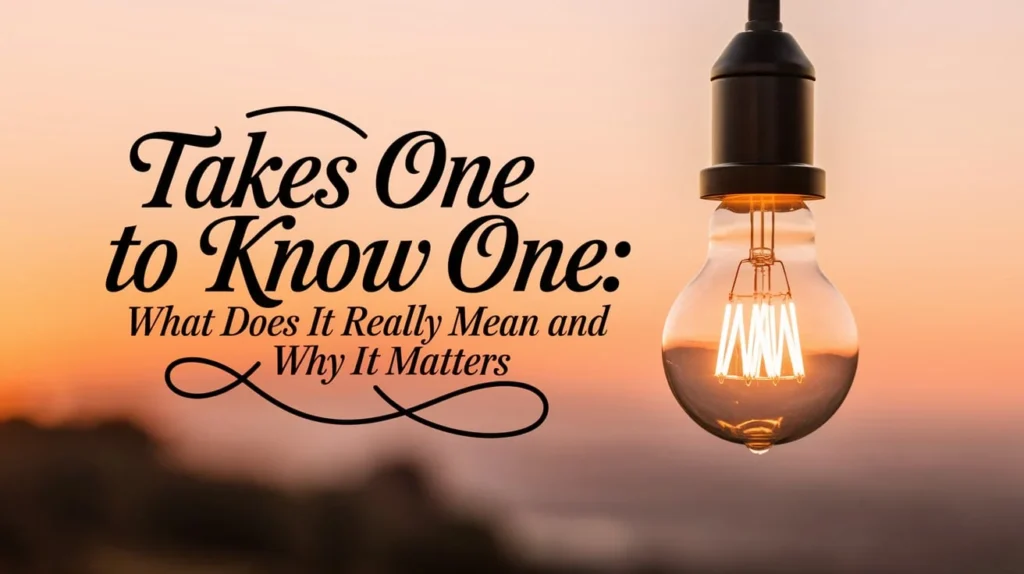Have you ever heard someone say, “Takes one to know one”? Maybe you’ve said it yourself during a conversation with friends, or even in a moment of frustration when someone accused you of something. But what does this phrase really mean, and why does it seem to pop up in so many different situations?
Well, let’s unpack it together. This phrase is more than just a casual comment. It’s packed with meaning and can tell us a lot about how we understand each other and ourselves. If you’ve ever felt misunderstood or seen someone else act in a way that reminded you of yourself, then this saying probably hits home.
In this article, we’ll dive deep into the meaning of “Takes one to know one,” how it influences our relationships, and why it’s something we should all think about a little more often.
What Does “Takes One to Know One” Really Mean?
At first glance, the phrase “takes one to know one” might sound like something that you’d hear in a casual conversation. It’s kind of a snarky, “I know you because I’ve been there myself” kind of comment. But when you really think about it, there’s a lot of wisdom hidden inside this simple expression.
Let’s break it down.
Imagine you’re talking to a friend, and they accuse you of being a little too sarcastic. You might throw your hands up and say, “Takes one to know one!” It’s your way of saying, “You wouldn’t recognize sarcasm unless you also used it all the time!”
But what’s really going on here is the idea that people who share a similar trait, experience, or behavior can easily recognize it in others. It’s like how you can spot a fellow dog lover from a mile away—there’s just something about the way they talk about their pets, the way they light up when they hear “puppy,” that gives them away.
In short, you spot in others what you’ve experienced yourself.
The Psychology Behind It
The saying “takes one to know one” actually has a solid psychological basis. It’s all about empathy, self-awareness, and human connection. When we’ve gone through something—whether it’s an emotion, a behavior, or an experience—we tend to have a better understanding of it when we see it in others. Think of it as a mental shortcut that helps us make sense of the world around us.
For example, if you’ve ever struggled with anxiety, you’re likely to be more aware of it in others. You’ll notice those little signs, like a person fidgeting or avoiding eye contact. Why? Because you’ve felt those exact same things. You know the feeling so well that it practically jumps out at you when someone else experiences it.
Why “Takes One to Know One” Matters in Relationships
Relationships—whether romantic, friendship, or family—are filled with moments when we recognize or relate to the people we care about. This is exactly when “takes one to know one” hits its mark. Understanding each other’s quirks, habits, and feelings is what strengthens the connection.
Let’s say you’re dating someone who tends to bottle up their emotions. Maybe you used to do the same thing. Over time, you learn how to recognize when they’re avoiding tough conversations, and it becomes easier to approach them in a way that encourages openness. That’s because you’ve been there, done that. You get it.
Being able to spot behaviors or emotions in others often creates deeper bonds. It shows that you’ve walked in their shoes, and it lets you approach difficult situations with more compassion. It’s the difference between saying, “Why are you acting like that?” and saying, “I know how you feel. Let’s talk about it.”
“Takes One to Know One” and Empathy
Empathy is at the heart of this phrase. When you’ve been through something yourself, you develop an ability to relate to others going through the same thing. But it’s not just about recognizing emotions. It’s about understanding what’s underneath them.
Imagine you’re having a bad day and your friend asks if you’re okay. Instead of saying, “I’m fine,” you share how you’ve been feeling. Why? Because your friend understands. They’ve felt what you’re feeling before, and they get it. Empathy makes all the difference in those moments.
Empathy doesn’t just apply to negative emotions either. When you see someone else getting excited about something—whether it’s a new job or an amazing vacation—you can share in their joy because you’ve been there too. This kind of emotional connection is what makes us human.
Why “Takes One to Know One” Can Be a Double-Edged Sword
While it’s true that recognizing traits or behaviors in others can deepen connections, there’s also a potential downside. We all have flaws, and sometimes, recognizing those flaws in others can lead to judgment. It’s easy to assume that someone else is doing something for the same reason you did it in the past.
For example, imagine someone who has a habit of canceling plans last minute. Maybe you used to do the same thing, and now you spot the same behavior in someone else. It’s tempting to think, “They’re just flaky, just like I was!” But are they really flaky, or is there a deeper reason? Sometimes, we’re too quick to jump to conclusions, and that can lead to misunderstanding or misjudgment.
So, while “takes one to know one” can be a great tool for understanding, it’s important to use it wisely. Just because you recognize a certain behavior doesn’t mean you know the full story behind it. Context matters.
Using “Takes One to Know One” to Build Stronger Friendships
In friendships, “takes one to know one” can be a game-changer. Have you ever had a conversation with a friend where you felt like they truly understood you? That’s the magic of recognizing shared experiences. Whether you’re talking about challenges at work, family drama, or personal growth, knowing that your friend “gets it” makes you feel heard and supported.
Let’s say you’ve been going through a tough time at work, and your friend, who’s been in a similar situation, offers advice. They don’t just give you generic advice—they share their own experiences and how they got through it. That’s because they know what it feels like. They’ve been there.
Friendship, at its core, is about feeling seen and understood. So, next time your friend opens up about something, try to recognize if it’s something you’ve been through as well. If you have, share your experience. If you haven’t, be there to listen. Listening is just as powerful as understanding.
“Takes One to Know One” in the Workplace
Now, let’s talk about the workplace. Can “takes one to know one” be helpful in professional settings? Absolutely. In fact, it might just be one of the secret weapons for effective leadership and mentorship.
Imagine you’re a manager who’s been through the grind of managing difficult clients, tight deadlines, and juggling multiple tasks. When you see one of your team members struggling with the same issues, you instantly recognize the signs. Instead of telling them, “You’ve got this,” you share your own strategies for handling stress or managing client expectations. Your experience becomes a valuable resource for them.
In leadership, empathy and understanding are key to helping others grow. When you’ve been in their shoes, you can offer more than just advice—you can offer genuine insight that comes from your own experience. And that makes all the difference.
How “Takes One to Know One” Can Help With Personal Growth
On the flip side, “takes one to know one” isn’t just about recognizing behaviors in others—it’s also about recognizing those behaviors in ourselves. Think about it: Self-awareness is one of the first steps toward personal growth. When you notice a trait or behavior in someone else that you don’t like, it might be time to take a closer look at yourself.
For instance, if you tend to get impatient with others, but you notice that same impatience in someone you work with, it might be a sign that you need to work on your own patience. Sometimes, recognizing a flaw in others is a mirror reflecting something we need to address in ourselves.
Personal growth is a lifelong journey, and recognizing patterns in ourselves and others is a powerful tool for self-improvement. It’s about understanding our weaknesses and being open to change. So, next time you think, “Takes one to know one,” ask yourself if you’re seeing something in someone else that you need to address in your own life.
FAQs About “Takes One to Know One”
1. Is “Takes One to Know One” an insult or a compliment?
It depends on the context. If someone says it in a playful way, it can be lighthearted or even a compliment. However, if it’s used in an argument or confrontation, it might come off as an insult.
2. Where did the phrase originate?
The exact origin is unclear, but it has been used in English for over a century. It likely evolved as a way to point out how people recognize qualities in others because they have them, too.
3. Can this phrase be used in a positive way?
Absolutely! If someone calls you creative, intelligent, or kind, you can respond with “Takes one to know one!” to return the compliment.
4. Why do we notice traits in others that we have ourselves?
It’s a psychological concept called projection. We often see in others what we relate to or have experienced firsthand, making it easier to identify similar traits.
5. Is “Takes One to Know One” always true?
Not always. While shared experiences can help us recognize traits in others, sometimes people assume things based on their own perspective, which may not always be accurate.
6. How can understanding this phrase improve relationships?
Recognizing that we spot traits in others because we have them too can lead to more self-awareness and empathy. Instead of judging, we might take a moment to reflect on why we noticed that behavior in the first place.
Conclusion: The Power of “Takes One to Know One”
So, what have we learned from the phrase “takes one to know one”? At its core, it’s about understanding. Understanding ourselves, understanding others, and knowing when to show compassion. It’s about empathy and recognizing shared experiences, both the good and the bad.
Next time you hear this phrase, think about how it applies to your own life. Are you recognizing behaviors in others because you’ve been there yourself? Or are you jumping to conclusions based on your past experiences? Whether it’s in friendships, relationships, or the workplace, “takes one to know one” reminds us that we’re all in this together—and understanding each other is the key to building stronger, more meaningful connections.

Mitchell Tate is a passionate numerology expert and a dedicated spiritual guide at angelnumbering.com. With a deep understanding of angel numbers and their significance, Mitchell strives to help readers unlock the mysteries of their lives through the lens of numerology.



